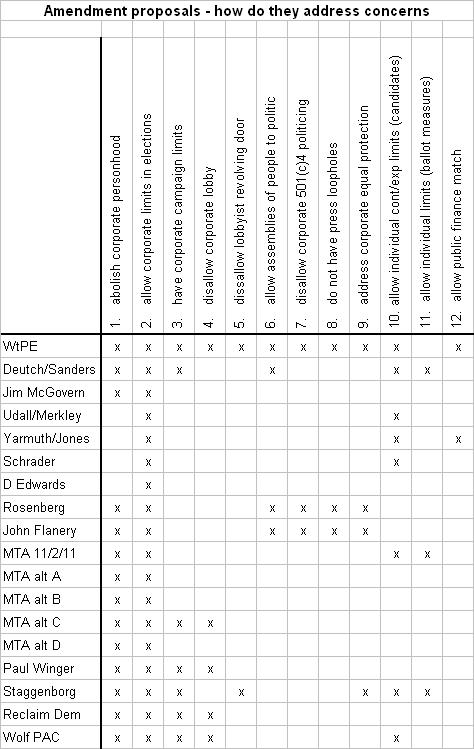Many Constitutional amendments have been proposed in Congress since 1995 to deal with excessive money in politics or inappropriate corporate constitutional rights. A good list with links can be found at http://united4thepeople.org/amendments/. Some interesting amendments have been proposed by various groups or people that have not yet been proposed in Congress.
We list some of the most prominent or interesting versions at http://www.wethepeopleeugene.org/amendment-language/. We also list a few of our suggestions at http://www.wethepeopleeugene.org/amendment-wtpe-version/
[this page is being updated – information below needs work]
The chart below is an attempt to show what issues the various amendment versions presented on the amendment language page address. Below the chart is a more complete description of these issues. Note that issues 13, 14, & 15 are not included in the chart, because no amendment version addresses these issues. Perhaps they are better addressed through legislation that is allowed by an amendment, but it might be worthwhile to think about these issues. It is useful to look at a couple other sites that discuss the issues related to amendment versions:
Tom Atlee’s discussion & Steven Rosenfeld’s detailed discussion
Rick Staggenborg’s discussion at Soldiers for Peace
There are other methods of fighting the corrupting influence of corporate money in elections, big money in elections, or corporate dominance of our local political processes besides amendments passed by two thirds of Congress. We will add information about these options soon, but here are some interesting links.
community empowerment by CELDF
call a Constitutional Convention – e.g. Lawrence Lessig
Article III, section 2 of Constitution – Larry Kachimba
Democracy issues to be addressed with one or more Constitutional amendments
1) Abolish corporate personhood – take away from corporations or other limited liability structures the constitutional rights that are inherent in people.
2) Corporate campaign financing – allow restrictions on donations and/or expenditures by corporations with the intent of influencing elections.
3) Corporate campaign financing – disallow donations and/or expenditures by corporations with the intent of influencing elections.
4) Corporate influence of political or public policy decisions – disallow donations and/or expenditures by corporations whose purpose is to influence legislation or public policy (except as stated in #6).
Issues 3 & 4 together could be addressed by language similar to a Wisconsin law on the books until 1953:
“No corporation doing business in this state shall pay or contribute, or offer, consent or agree to pay or contribute, directly or indirectly, any money, property, free service of its officers or employees or thing of value to any political party, organization, committee or individual for any political purpose whatsoever, or for the purpose of influencing legislation of any kind, or to promote or defeat the candidacy of any person for nomination, appointment or election to any political office.”
5) Disallow Congressman or any of their paid staff, or any paid staff of the executive branch, from ever being paid by nongovernmental sources for trying to influence, or organizing others to influence, political decisions or public policy in the United States (“lobbyist revolving door”).
6) Do not disallow first amendment rights to assemblies of natural persons – 501(c)4 or related sorts of organizations may be disallowed by some language from influencing political or public policy decisions, when that is in fact their reason for existence.
7) In trying to retain rights for assemblies of natural persons (issue #6), some language would also allow corporate controlled 501(c)4 organizations to influence political or public policy decisions. This should be disallowed.
8) Do not have unintended loopholes relating to freedom of the press – explicitly not limiting freedom of the press may allow workarounds that continue corporate dominance of our political system.
9) Do not have unintended removal of equal protection for corporations with regards to other corporations – 14th amendment protection may be needed for corporations, but not in comparison to people, only in comparison to other corporations.
10) Allow limits on contributions and expenditures by individuals for election campaigns for candidates.
11) Allow limits on contributions and expenditures by individuals for election campaigns for issues.
12) Arizona Free Enterprise Club v. Bennett – allow public campaign financing that provides additional funds to a publicly financed candidate when a threshold of spending by their privately financed adversaries is reached (“public finance match”).
13) Language to balance the corrupting effect of contributions and or expenditures by individuals for the election of candidates with the free speech rights of individuals.
14) Language to balance the overbearing influence of extremely wealthy individuals on plebiscites with the free speech rights of those individuals.
15) Set up parameters that a public campaign financing system must follow.
